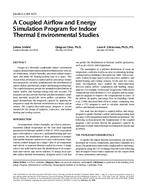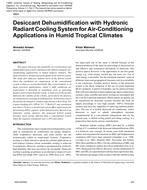Click here to purchase
In order to mitigate the effects of climate change, the Kigali Amendment to the Montreal Protocol set the path to decrease global greenhouse gas emissions. The adoption of low Global Warming Potential (GWP) refrigerants in commercial refrigeration systems is progressively reducing their impact on the environment. However, the main impact of commercial refrigeration in climate change usually comes from indirect emissions that are generated during energy production and depend heavily on the energy efficiency of the systems. In this study, two common store sizes and cooling duties have been modelled to evaluate several refrigeration systems for hydrofluorocarbons (HFC), hydrofluoro-olefins (HFO ), transcritical CO2 and propane, in typical and advanced system architectures. Annual ambient temperature profiles of two locations in Latin America have been determined to simulate the system performance at mild and hot climates. Comparisons of resulting system performance, greenhouse gases emissions and lifetime cost have been performed. The greatest benefits were found to be obtained by Low GWP HFO advanced system architectures.
Product Details
- Published:
- 2023
- Number of Pages:
- 14
- Units of Measure:
- Dual
- File Size:
- 1 file , 2.9 MB
- Product Code(s):
- D-AT-23-C024
- Note:
- This product is unavailable in Russia, Belarus


